Yesterday, US stocks advanced, with the two most quoted averages breaking new record closes, as corporations signaled that the largest tax overhaul in thirty years will lead to increased earnings in 2018.
The S&P 500 Index climbed 0.94 percent, its biggest gain since November, to a record close but not a record high.
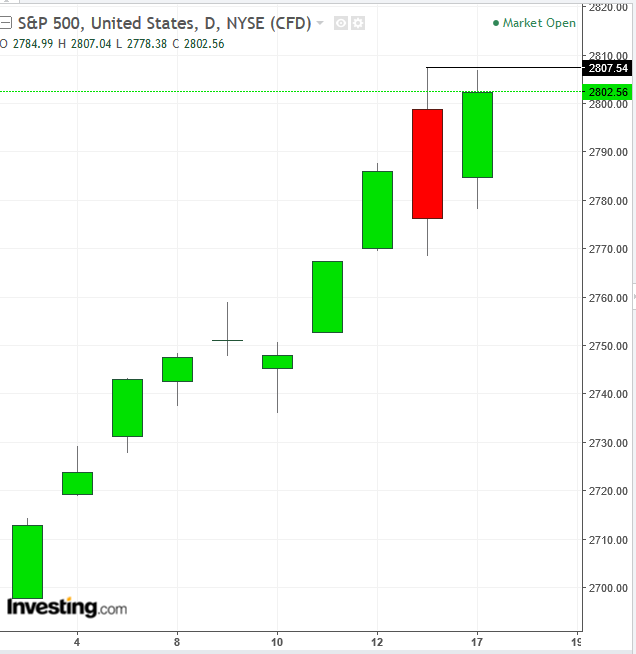
The Dow Jones Industrial Average advanced 1.27 percent, more than 300 points. Its green candle was longer than yesterday’s red candle, climbing back and closing above the 26,000 key-level, to what was both a record close and a record high. The Dow Jones Index jumped to its next thousand milestone at the fastest pace in its history, only eight days after the previous thousand milestone. The question is whether this record supports a sustainable bull market or whether excessive greed will potentially topple it.
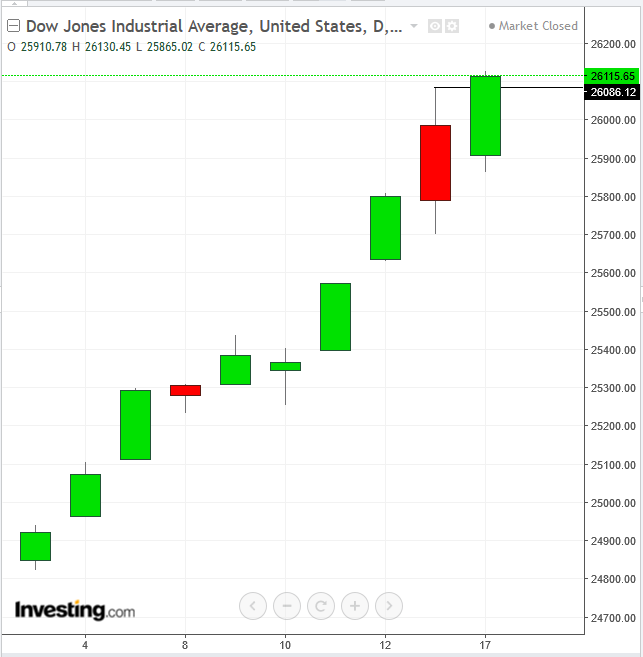
The NASDAQ Composite rallied 1.02 percent, to a record close but not a record high.
The Russell 2000 climbed 0.94 percent, like the S&P 500, but despite high hopes that it would be the biggest beneficiary of corporate tax cuts, it achieved no record.
Internally, the S&P 500 sector that led the advance with a wide margin was Technology (NYSE:XLK) with a 1.50 percent gain, while Consumer Staples (NYSE:XLP) was 0.39 percent behind it at a 1.11 percent advance. While all the other sectors were green, they gained below a percentage point. The sector that lagged the most was Industrials (NYSE:XLI) with a 0.48 percent gain.
The market narrative was dominated by taxes. Financials (NYSE:XLF), gained 0.82 percent, led by Bank of America (NYSE:BAC) which beat estimates, indicating that it stands to benefit from the corporate taxes. Apple (NASDAQ:AAPL) led the Technology sector (NYSE:XLK) higher, also citing the tax overhaul which will enable the company to repatriate billions to invest in jobs and facilities, contributing to further growth.
It seems clear that the immediate and specific reason for the bullishness, especially for financial firms, is the current tax overhaul, which has resulted in companies reporting on deferred tax assets. It’s unclear though, what the outcome will be down the line. Nevertheless, as we have been reporting on a running-narrative basis, since the Brexit vote, equity traders shoot buy orders first and ask questions later. We’ll have to wait and see at the end of the year what outcome these tax deferrals will have on earnings.
Today, China’s government reported its country’s economy grew by 6.9 percent in 2017, beating estimates in what is its first growth acceleration in seven years. This growth comes on the back of strengthening exports, construction and consumer spending. This last factor is imperative, as China, the second largest economy in the world, has been making strenuous efforts to boost this gauge as part of its path from an emerging to a developed economy.
Some, however, believe data has been overstated by the Chinese government, including the New York Times which published an article titled: “China’s Economic Growth Looks Strong. Maybe Too Strong.” Nevertheless, the data added fuel to the fiery hopes counting on the global growth narrative, setting the stage for upbeat profit expectations to potentially make a bull run into next year and beyond, according to a Bank of America Survey of fund managers.
European equities opened 0.25 percent higher, climbed to 0.38, and pared down to a modest 0.12 percent gain. The leading sectors were retailers and technology, even as the euro rebounded from yesterday’s pullback, which surprisingly did little to help stocks. Technically, we have reported of a continuation pennant that has provided an upside breakout, with a warning of a bull-trap; then, reported the trap sprung, failing the breakout. Today’s rise and fall extended the pennant, widening its range.
Treasuries were steady, with the U.S. 10-year yield around 2.6 percent, after falling yesterday on speculation that Congress will avert a government shutdown.
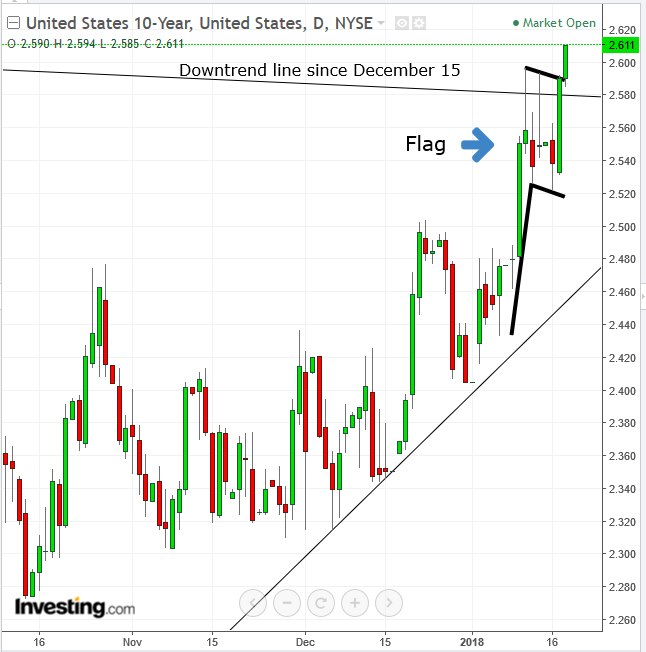
The dollar – after opening lower – climbed back to the height of yesterday’s closing price, but was unable to hold on to those gains, returning to its lower, opening price.
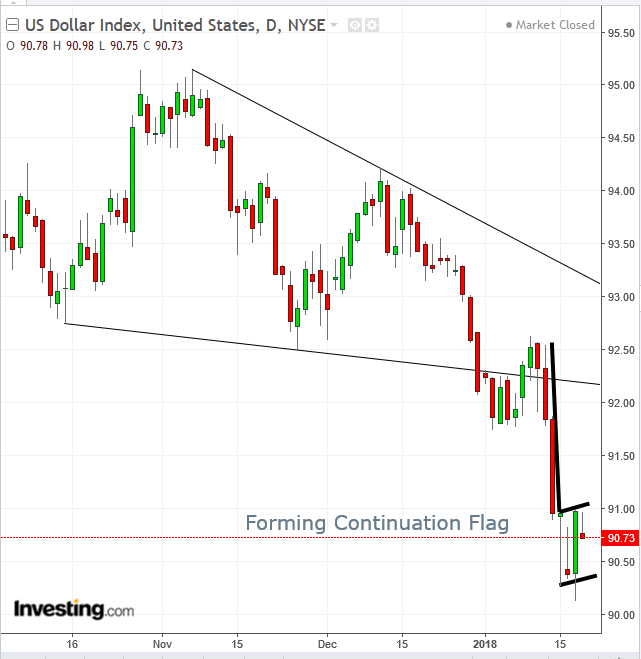
The euro, which is the greenback's biggest trading currency, rebounded in mirror image, even after verbal intervention from the ECB yesterday.
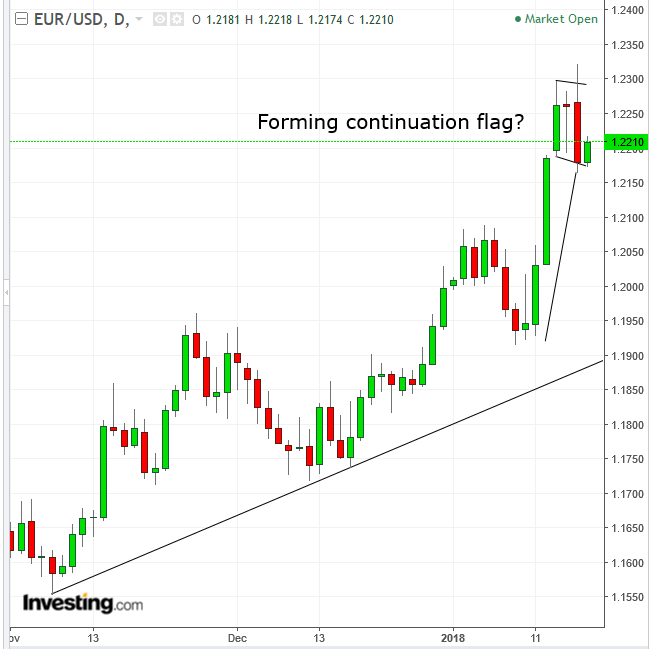
Elsewhere, Bitcoin steadied above $10,000 after a day of wild swings. Emerging market stocks gained for a fifth day.
Bitcoin is struggling over the $10,000 key-level, with wild swings above and below for the third day in a row, after reversing its trend and entering a bear market. It seems that a decisive break below the $10,000 level may cross over the bulls’ line in the sand, paving the way for another drop.
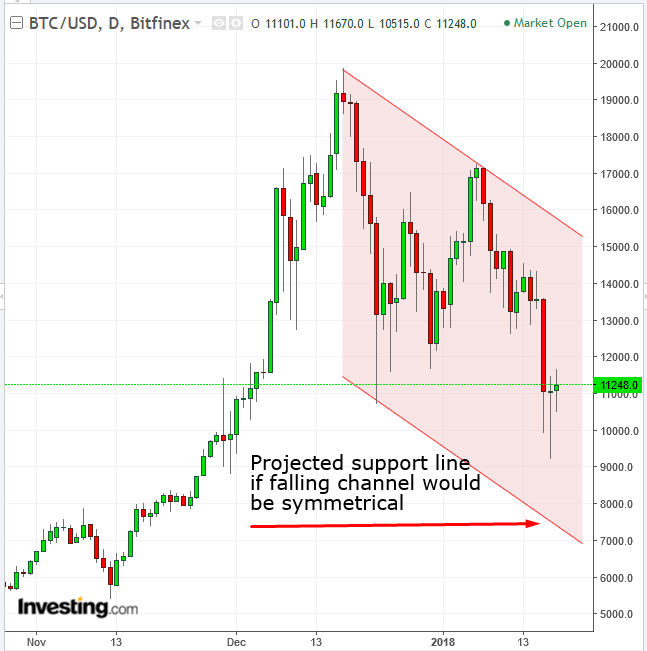
West Texas oil was flat as OPEC shows determination to curb production. Oil initially slipped yesterday, only to rebound to a gain, after US government stockpile data due today was forecast to fall for a ninth week.
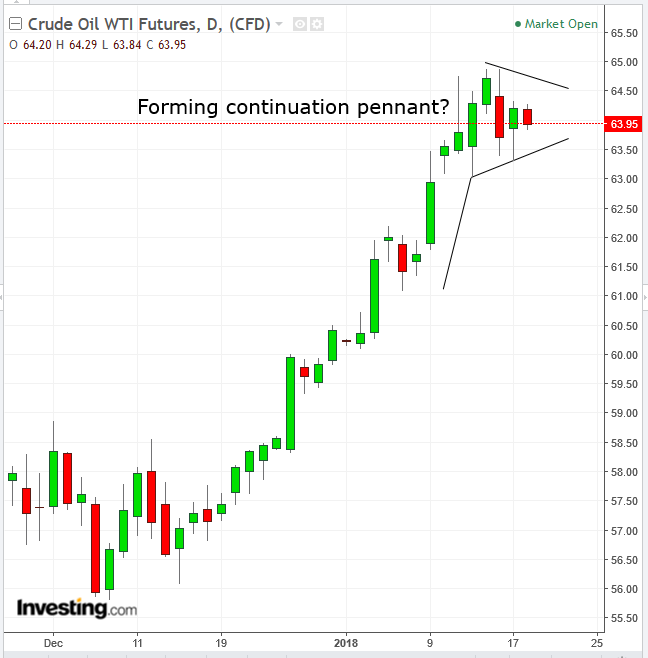
Up Ahead
- U.S. housing starts due today, are likely to have slipped in December for the first time in three months as frigid winter weather impeded work.
- Central banks in Indonesia, Turkey and South Africa are all expected to keep policy unchanged.
Market Moves
Stocks
- The Stoxx Europe 600 Index gained 0.1 percent as of 8:27 a.m. London time (3:27 EST).
- The MSCI All-Country World Index dipped 0.1 percent.
- The U.K.’s FTSE 100 Index fell 0.2 percent to the lowest level in more than a week.
- Germany’s DAX Index climbed 0.2 percent.
Currencies
- The euro advanced 0.2 percent to $1.2208.
- The US Dollar Index opened 0.22 percent lower and resumed its decline to 0.28, trading now at the bottom of the session, signaling that bears are in control.
- The British pound rose 0.1 percent to $1.3839, hitting the strongest level in 19 months.
- South Africa’s rand climbed 0.4 percent to 12.2498 per dollar, the strongest in more than two years.
Bonds
- The yield on US 10-year Treasury increased less than one basis point to 2.59 percent, the highest level in about ten months.
- Britain’s 10-year yield advanced three basis points to 1.334 percent.
- Germany’s 10-year yield gained two basis points to 0.58 percent, the biggest gain in a week.
Commodities
